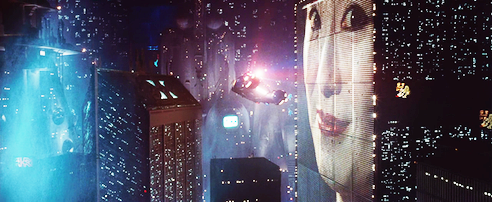 |
| Blade Runner, dir. Ridley Scott (1982) |
The films we discuss on this blog are often an individual
view of the philosophy in [insert title here]. But we also have public
discussions - Philosophers at the Cinema is a regular season of screenings at
Norwich's delightful Cinema City. Recently, collective members Vincent M. Gaine
and Rupert Read went on Radio Norfolk to discuss this programme and our latest
showing, Blade Runner. The screening was followed by a discussion around the
philosophical points of the film, which included such points as the environmental damage depicted in the film, and the importance of animals in relation to empathy and the loss thereof.
Blade Runner is a film that prompts a plethora of
interpretations and debates, the least interesting of which is "Deckard -
replicant or not?" Of particular interest to me is the film's future world
(now only three years away), in which technology, capitalism, consumerism and advertising
has completely taken over. It is testament to the film that its Los Angeles
expresses so much through suggestion and implication, not explicating why large
buildings are deserted, why it rains so much, what happened to all the animals.
Omnipresent advertising bombards the inhabitants of this city at every turn,
promoting "A better life" that seems perpetually out of reach.
 |
| Blade Runner, dir. Scott (1982) |
It is unsurprising that replicants - artificial people -
have become indistinguishable from humans in a world where artifice is so predominant.
A key philosophical question, as discussed by Locke and Dennet, is what
constitutes a person. While one can ask these questions about the replicants,
it seems appropriate to ask them of the (presumably) human characters as well,
not only Deckard but also Bryant, Sebastian, Tyrell and Gaff. If a key element
of being a human/person is empathy, Bryant and Gaff at least are largely
impersonal. Bryant refers to replicants as "skin jobs," while Gaff
regards Deckard's work of licensed executioner as "a man's job."
Tyrell is far from empathetic, indeed his intellect seems to have divorced him
from emotion. His creation and then rejection of Rachael is irredeemably cruel
- he created an entity that can think and feel, then discards her when she
becomes inconvenient. Roy fares no better - his brief lifetime little more than
an academic discussion for Tyrell. Tyrell's death is therefore fitting, his
head crushed by Roy while (in the Director's Cut) the viewer sees the impassive
and unconcerned owl. Much as Tyrell has no concern for the replicants, this
artificial bird has no concern for him. By implication, nor does the film or
its world. Personhood is deemed insignificant by the omnipresence of consumer
technology, the agony of Tyrell evincing as much sympathy as the swift
retirement of Leon. Blade Runner therefore performs philosophy through its
prioritisation of commerce over humanity, as salient a message today as when
the film was first released.
| Blade Runner, dir. Scott (1982) |
